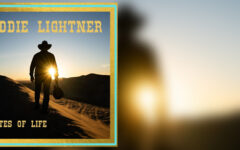
 Though Sideline was originally formed as a side project for several prominent musicians during the winter bluegrass off-season, the group has become a full-fledged touring and recording act. There have been a few changes to the band’s lineup, but they’ve maintained a driving, traditional sound that has earned them a devoted fan base. Their third album, Colors & Crossroads, has just been released from Mountain Fever Records.
Though Sideline was originally formed as a side project for several prominent musicians during the winter bluegrass off-season, the group has become a full-fledged touring and recording act. There have been a few changes to the band’s lineup, but they’ve maintained a driving, traditional sound that has earned them a devoted fan base. Their third album, Colors & Crossroads, has just been released from Mountain Fever Records.
Opening the album is Chris Jones’s Uphill Climb, kicked off with Steve Dilling’s crisp banjo and a bit of dobro from Brad Hudson. It’s a textbook example of the popular modern traditional style. The band has a full, tight sound – there are no wasted notes. Mandolin player Brian Aldridge gives it his all on the lead vocals; he has an energetic, smooth voice that fits this song well. You Don’t Know What You Got Till It’s Gone has a similar feel. Written by Tommy Long, the title sums up the lyrics well. The singer’s woman has left him, and he realized how much he needed her just a little too late. Nathan Aldridge’s fiddle solo is a particular highlight.
Aldridge’s fiddle sets the tone for the band’s cover of Del McCoury’s This Kind of Life, an older song from Del’s Dixie Pals days. It’s a well-written number that finds the singer tired of the rambling life: “This old road, it just keeps getting longer. This kind of life is not for me.” Kudos to the group for digging this one out of the bluegrass catalog – it’s one of my favorites on this album. Another old number, though probably more familiar to most listeners, is Unwanted Love. Reno & Smiley wrote it, but it’s perhaps most associated with the Johnson Mountain Boys, and Sideline has brought in Dudley Connell to guest on their version. Connell is excellent, as always, and the band finds the right groove and stays there throughout the song.
The title track, penned by Brink Brinkman, has a gentler melody than most of the rest of the album, with an acoustic country feel. It’s a detailed ode to the beauty of fall in the mountains guided by melodic guitar. The Blame could also be called acoustic country, and was in fact originally recorded by late eighties country group Highway 101. Highway 101’s cut is heavy with steel guitar, which Sideline replaces with wistful fiddle. It’s a solid number about lost love, with a clever turn of phrase in the chorus: “It’s not whether you win or lose, it’s how you lay the blame.” Other highlights here are a gritty Darlin’ Corey, with clawhammer banjo from Skip Cherryholmes and unflinching lead vocals from Hudson, and Gospel track Lord of All Men, which finds Cherryholmes, who sings earnestly and enthusiastically, taking over on lead. Dilling, whose banjo throughout the album is completely on point, seems to be particularly channeling J.D. Crowe here.
Sideline’s first album depended mostly on hard-driving, amped up versions of classic bluegrass songs. It worked, thanks to a great cast of musicians and fans’ enduring love for traditional bluegrass. On Colors & Crossroads, it seems like the group has broadened its horizons a bit. Dilling, Cherryholmes, Hudson, Brian Aldridge, Nathan Aldridge, and Jason Moore (whose bass work is, as always, among the best in bluegrass) have combined lesser-known tracks with a handful of new songs to create a very well-rounded album. If you’re looking for tasteful modern traditional grass, add Sideline’s Colors & Crossroads to your list.
For more information on Sideline, visit them online at www.sidelinebg.com. Their new album is available from several online retailers.







